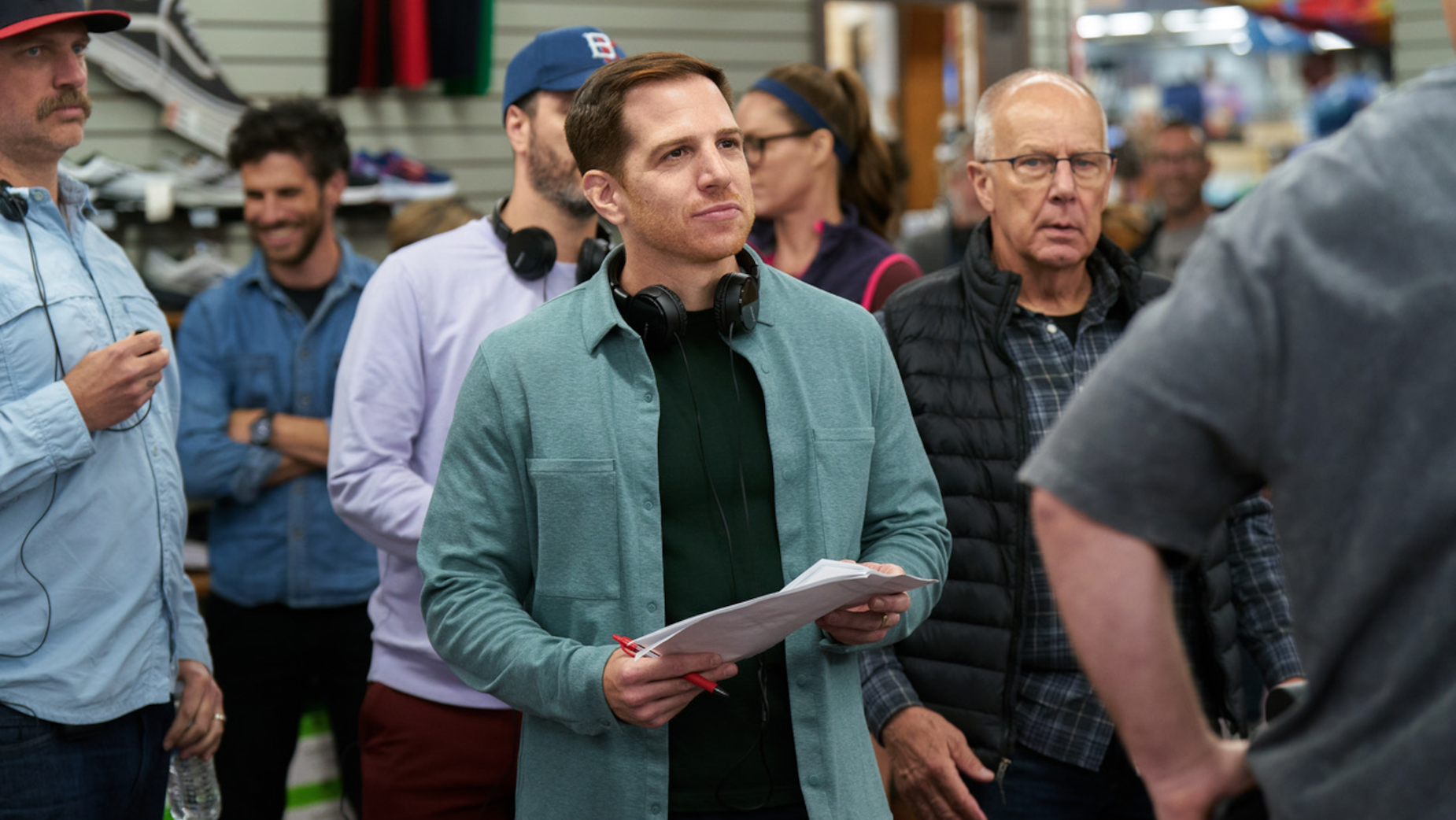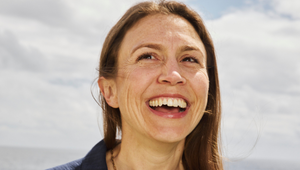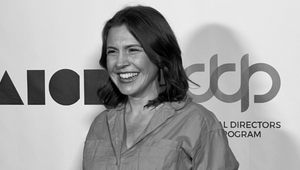
The Directors: Jared Lapidus

Jared Lapidus is a director and writer whose affection for filmmaking began as a childhood fascination with his father’s laserdisc collection. A graduate of NYU’s Tisch School of the Arts, Jared credits his sharp comedic sensibilities to his years spent as an editor, where he honed his instincts for timing, rhythm, and pacing. His work first gained attention via his sketch comedy group, Reverse Cowboys, where he parlayed their string of viral hits into television directorial work, along with dozens of commercial campaigns for brands such as TurboTax, Little Caesars, OREO, Verizon, A&W, Scotts, Quilted Northern and many others.
Jared’s worked with Martin Short and Kevin Kline on Lorne Michaels' Maya & Marty, directed Netflix's six-time Emmy nominated series, The Who Was Show, along with What's Cooking Tonight? - a Netflix special starring the incomparable Michelle Obama, Jennifer Garner, & Jack Black. He recently made his feature film directorial debut with Office Race, a Comedy Central original film which he also co-wrote, starring Beck Bennett, Joel McHale, J.B. Smoove, Alyson Hannigan, and Kelsey Grammer.
LBB> What elements of a script sets one apart from the other and what sort of scripts get you excited to shoot them?
Jared> Whether its a novel premise that I haven’t seen before, or a familiar scenario with undeniably clever dialogue, I think my very simple litmus test is whether the script itself makes me laugh. If it manages to do that, I’m instantly invested, and have a pretty intuitive sense for how to bring it to life, and ideally elevate along the way.
LBB> How do you approach creating a treatment for a spot?
Jared> There are the usual buckets to fill - tone, aesthetics, visual language, casting, etc, but before anything, I try to find my way in via theme. Whether its a universal truism that we’re tapping into, or something silly and hyper-specific, I usually like to establish the 'thesis' of my approach up top, and let all the other creative decisions follow from there. Earlier in my career, I was a bit meeker and more deferential in my approach, assuming the posture of “I can execute exactly what’s on the page”, but I’ve come to realise that more often than not, creatives (especially those with whom I’ve had the best relationships) are looking for a director to take the reins of the project and swing for the fences, creatively. So I like to include tons of ideas or options, all of which I’m excited about but none of which I’m precious about, so that we can chat through, discuss their suitability / feasibility, and allow other ideas to flow from there.
LBB> If the script is for a brand that you're not familiar with / don’t have a big affinity with or a market you're new to, how important is it for you to do research and understand that strategic and contextual side of the ad? If it’s important to you, how do you do it?
Jared> No matter what the work is, I think it’s important to know your audience. So in that sense, if I’m doing work for a product or category I was previously ignorant of, I generally try to educate myself on the brand and the need it fills. In addition, I’ll familiarise myself with any work they’ve done in the past, determining whether this is a continuation of a successful campaign or a total reboot.
LBB> For you, what is the most important working relationship for a director to have with another person in making an ad? And why?
Jared> Undoubtedly, the most important working relationship is with the agency creative team. In most cases, the spot is their brainchild - they’ve been with the material far longer than I have, pitching it and selling it through and finally entrusting me to bring it to life. I feel a great responsibility to understand their POV and deliver on the full promise and potential of the scripts.
LBB> What type of work are you most passionate about - is there a particular genre or subject matter or style you are most drawn to?
Jared> I’m a comedy director and writer, and nothing excites me more than a funny script with a pair of creatives (and a brand) behind it who are oriented towards making the funniest spot possible. There are all kinds of sub-genres within comedy (naturalism, absurdism, surrealism, etc), and I find them all equally exciting to tackle. That said, I absolutely love working with actors on dialogue driven comedy - add in some stunt work or a physical comedy set-piece and I’m in heaven.
LBB> What misconception about you or your work do you most often encounter and why is it wrong?
Jared> Something that’s unique to the ad world is the division of labour, and though I write and direct film and television, I’m usually not the writer on the commercial work I direct. Granted, I’ll pitch ideas and punch up jokes as much as I can (especially if there’s an appetite for it), but ultimately, the spots I direct were conceived by someone else. So as you build your body of work, you tend to get pigeonholed, as if that’s what you 'do', or all you can do, when really, that’s just the work that you’ve won, and often times not exactly the work you want to be doing. So while I absolutely love working with celebrities and am grateful to direct lots of them as spokespeople, I relish the opportunity to create funny / stupid / weird little 30-second worlds with little-known dramatic actors who are eager to show their stuff.
LBB> Have you ever worked with a cost consultant and if so how have your experiences been?
Jared> Certainly. The best cost consultants I’ve worked with come from a producing background, and have a deep understanding of the boots-on-the-ground realities of production. Even better if they have an investment in the creative and the success of the finished product. Occasionally, a cost consultant will be strictly motivated by the numbers and unsympathetic to the particularities of a given shoot. In other words, they can be penny wise and pound foolish, limiting expenses essential to the successful execution of the scripts, and thereby advocating against the quality of the finished project. Thankfully, this has rarely been the case, in my experience.
LBB> What’s the craziest problem you’ve come across in the course of a production – and how did you solve it?
Jared> Not sure if this is the craziest problem, but it’s a testament to the incredible talent working in this business. I did a New Years Eve promo for CNN starring Anderson Cooper and Andy Cohen, and the script called for us to shoot in Anderson Cooper’s private office, which is located somewhere deep inside CNN’s fortified Manhattan skyscraper. We were never going to get all of our crew and gear inside under any circumstances. So instead, we took copious scout photos and had our intrepid production designer, Marko Orso, build a 1:1 recreation of Anderson’s office on a soundstage nearby. Anderson himself was speechless as he walked onto set, looking like a bewildered Wayne Campbell walking onto the soundstage recreation of his Wayne’s World basement.
LBB> How do you strike the balance between being open/collaborative with the agency and brand client while also protecting the idea?
Jared> As I mentioned earlier, you’re ultimately there because the creative team, along with the client, has entrusted you to bring their project to life. I like to have a running dialogue with the creative team, keeping them apace with all our progress, making sure they’re onboard with any major decisions or departures. It’s my job to interpret the original script and establish a vision for the project, but that needs to be subsumed under the rubric of making sure the agency and client are thrilled with the finished product.
LBB> What are your thoughts on opening up the production world to a more diverse pool of talent? Are you open to mentoring and apprenticeships on set?
Jared> I find few things more satisfying than helping young directors find their footing in this unusual line of work. For years, I've taken part in the formal mentorship program at my alma matter, NYU Tisch film school. In addition, I have many informal mentor / mentee-like relationships with young filmmakers who are eager to make their mark and break into the business, but are stifled and intimidated by the opaque structure of the ad world. I do what I can to provide perspective and demystify things, and help orient their resources and efforts towards being productive and self-motivated, along with making professional connections for them whenever possible.
LBB> How do you feel the pandemic is going to influence the way you work into the longer term? Have you picked up new habits that you feel will stick around for a long time?
Jared> One silver lining of the pandemic has been the migration of agency calls from telephone to zoom. Old school agency calls were, by definition, faceless, impersonal, and awkward, and the transition to zoom has been unbelievably welcome and helpful. Not only can you now put a face to a name, you can get a feel for the room and have a more human interaction. Granted, nothing beats face to face, and no one wants to spend their entire day on zoom, but when meeting or pitching the creative team, I’ll take zoom over a phone call any day of the week.
LBB> Your work is now presented in so many different formats - to what extent do you keep each in mind while you're working (and, equally, to what degree is it possible to do so)?
Jared> Since the distribution platform (linear, YouTube, Instagram, TikTok) so often dictates the aspect ratio, I usually let the media strategy inform the shooting approach. More often than not, the hero spot of a given campaign will be aired in 16:9 (with 1:1 crops for social), whereas some explicitly social pieces will air in 1:1 or 9:16. While it’s impossible to optimise simultaneously for both 16:9 horizontal and 9:16 vertical, you can usually protect for 1:1 in either format. And if the deliverable is natively 9:16, I’ll put the camera on it’s side and shoot vertically to maximise resolution.
LBB> What’s your relationship with new technology and, if at all, how do you incorporate future-facing tech into your work (e.g. virtual production, interactive storytelling, AI/data-driven visuals etc)?
Jared> I find all of these new and emerging tools incredibly interesting and exciting, and certainly worthwhile of being familiar and competent with their use - but if I’m being honest, what I love most about filmmaking is the challenge of being in a real space with real actors. There’s something intangible about being on location versus on a stage (Anderson Cooper’s office being an unavoidable exception), that makes the entire process that much more engaging and exciting. The possibilities with virtual production and emerging technologies are limitless, but I find that within the constraints of real world production, creativity flourishes.
LBB> Which pieces of work do you feel really show off what you do best – and why?
Jared> Triscuit - 'Go Toppingless'- This one felt like lightning in a bottle. From a wonderfully subversive premise, to the dry, awkward tone, to the bleak and droll art direction, the pitch perfect casting, performances, and prat falls, this spot is a personal favourite.
Peacock - 'Meet Neil' - I had a hand in shaping the concept and script for this one. Really pleased with the singular character study, the ensemble and improvisational elements, along with the cinematic direction and storytelling.
A&W - 'No Plans Plan' - I love the vintage look of this piece, the jaunty and whimsical tone, the energy of the music, the casting of our lead, the visual storytelling, and the fun payoff at the end.
Latrice Royale for Ruby Royale - Among all my celebrity direct-to-camera spots, this was probably the most fun to shoot. I loved the premise, and the saucy comedy, and the wonderfully playful art direction.















